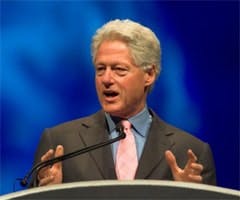Therapeutic Dose: Courting Biotech
Local, regional and national trade associations were, literally, wining and dining BIO attendees, from a night of sake and sushi with the Japanese External Trade Organization to a wine tasting gala courtesy of Biotechnology Australia. If you werent having cappuccino with Italians, you were eating fresh-baked macadamia nut cookies with the Hawaii contingent. On the show floor, they flew banners and balloons, and hoisted signs shouting their names to the world: the Wallonia (Belgium) Trade and Investment Agency, Shizuoka Prefecture, Oslo Teknopol, Incheon Free Economic Zone Authority, Bio Nebraska Life Sciences Association, the State of Bavaria, BioSingapore, Floridas Great Northwest, and on and on.
The collective effect was a circus atmosphere. Even Magic Johnson and Bernie Mac added to the sense of surrealism. Smack dab in the middle of the McCormick Place convention center, the worlds largest indoor field of corn somehow grew tall and green.
BIOs plenary speakers focused on biotechnology as a force for good. Peoples interdependence is the dominant feature of the modern world, said President Clinton in his address. We have to spend the next few decades [moving] toward a more integrated set of communities, he exhorted. We must strive for a world of shared opportunities and shared responsibilities.
We must think beyond the borders of this nation, said Centocor president Julie McHugh. The challenges of the developed world are undeniably easier to see . . . but it is my hope that the collective genius that our industry holds will be a torch of hope for the rest of the world.
Biotech is more than medicine or agriculture, said Amgen senior VP of global government affairs David Beier. Its a commitment to improving the human condition.
Biotech is good for economies, and whats good for economies is usually good for communities. For every dollar invested in biotech, nine are returned to the greater society, Beier claimed, citing an Amgen-sponsored study.
Its unrealistic to think that the rising bio tide will lift all boats. When you cut through the rhetoric, BIO 2006 was all about money, and it was every city, state, region or country for itself.
A few days before the conference, I was invited to interview Ohio Gov. Bob Taft. I consented, not sure of why I had been asked. Once I sat down with Taft the great grandson of William Howard Taft, by the way his mission was clear: sell Ohio.
He pitched the tax and tort reforms that have made the state fertile ground for high-tech businesses, the job creation credits and million-dollar grants for companies that locate there, the public-private consortia to encourage education and jobs. The high quality of life, the transporation infrastructure, the fact that Amylin Pharmaceuticals and other growing companies were locating there. I got the best that the Ohio governor had.
Improving the human condition takes precedence over all that we do. But that was really the last thing that Taft and other dignitaries at BIO had on their minds. We have to be aggressive, he said. We have to get Ohio out there for everyone to know about.
And hes right. Global competition is brutal, and as the last of the red-hot growth industries, biotech is the apple of everyones eye.
Taft spends much of his time as a traveling salesman: Chicago, New York, California, Germany, France.
Everybody wants bio, but is there enough to go around?

